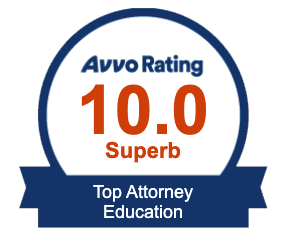This is the third segment on the differences between the IDEA and section 504. There are commonalities, of course, between these two federal special education law and regulations which I will highlight during this discussion. I have provided an overview of the IDEA and Section 504 and how these two laws interact and sometimes overlap in ensuring children with disabilities receive a free appropriate public education. To briefly recap some of the prior posts, we know, for example, the child find provisions of the IDEA and Section 504 are similar and overlap. More importantly, we know that if a school system determines that a child does not qualify under the IDEA for special education and related services then it must refer that child for an eligibility determination under Section 504. We also know the term “child with a disability” is broader under Section 504 than the IDEA. The IDEA is limited to thirteen (13) eligibility categories and the child’s disability must adversely affect the child’s educational performance and is in need of special education and related services except for a speech disability. A child with a disability for Section 504 eligibility does not have to meet this eligibility criteria. A child under Section 504 may have a temporary disability and qualify for special education or related services. Some children with ADHD may not qualify under the IDEA but will qualify for special education and related services under Section 504. In these cases, school system are required to develop a Section 504 plan or an accommodations plan to serve the child. School systems vary considerably on how much detail a Section 504 Plan should contain. A Section 504 Plan does not have to meet the detailed legal requirements of an IEP. In general, a Section 504 Plan will state the child’s disability, and how the disability substantially impairs the child’s learning at school. The Section 504 Plan will contain reasonable accommodations for the child to be served or learn at school.
A child with a medical impairment may not need special education and related services, but will need accommodations for the child to attend school. For instance, if the child is diagnosed with chronic figure syndrome which affects the child’s ability to attend school regularly or when at school affects the child’s vitality and concentration during certain parts of the school day, then a Section 504 is appropriate. The accommodations that may be implemented for such child is permitting the child time periods when he can rest or sleep if necessary. There may be accommodations to give the child more time for test testing, to complete assignments or be given shorter class assignments. There may be accommodations for the child to leave school early or attend school later in the morning. I represented a young child many years ago who had a severe seizure disorder. She also had multiple physical and intellectual disabilities as well. Before leaving for school or early in the morning, the child could have a seizure that affected her ability to go to school. The school system was required under Section 504 to permit her to begin classes later in the morning when she had a severe seizure earlier in the morning before going to school. Of course, the child’s class schedule and curriculum had to be changed or accommodated when she had such seizures. A child with a contagious disease must be accommodated at school. A school system cannot exclude a child with a contagious disease simply because the child may pose a risk of contagion to other students. Back in the 1980’s and 1990’s, there were a number of court cases addressing the school system’s obligation to make reasonable accommodations for children with Hepatitis B or HIV. The courts adopted legal and medical standards prohibiting a school system from segregating a child with HIV, for instance, from other students except under limited circumstances.
Another good use of Section 5o4 that we have not discussed is that this law protects a child outside the school and outside the school day. The IDEA only applies to children that attend school during usual school hours and extracurricular activities. But what if have a child with challenging behavior problems that cause a problem for school staff during a field trip to a museum or other extracurricular activity. A school system cannot exclude a child with challenging behavior problems from participating in extracurricular activities or field trips unless the school cannot provide reasonable accommodations so the child can participate in such activities and programs. If the child requires a behavior plan or a paraprofessional to attend such activities and programs, then the school system must generally provide such aids and services for the child. But what if the child with challenging behaviors is not attending public school but an after school program that is not operated by the school system. Does the entity or program still have to serve that child? The answer is yes in most situations. Under Section 504 any entity or program receiving federal financial assistance must make reasonable accommodations to the program or activity to the child can attend it. If the entity or program does not receive federal financial assistance, then the Americans with Disabilities Act(ADA) would apply. The ADA provides parallel or similar provisions to safeguard and protect the rights of children and adults with disabilities. but we will not go into any in-depth discussion of the similarities and differences between Section 504 and the ADA at this time. If you want more information or advice on these laws pertaining to children, youth and adults outside of a school system, then contact a special education attorney or an attorney that concentrates in Section 504 and ADA.
I regress. . . so if you have a child that attends an after-school program who has a disability, make sure that the program is compliant with Section 504 and the ADA. An after school program must serve a child with a disability if that child otherwise qualifies for that program or activity. I represented a parent that would bring her child with autism to an after school program. The program was operated by the school system and not by local government or independent private contractors. The child had some challenging behaviors. The facility would not allow the child to attend because he exhibited challenging behaviors from time to time unless the parent paid the facility about $50.00 a week so a behavioral aide could be hired. I filed a complaint with the U.S. Department of Education Office for Civil Rights under Section 504 and the ADA. I alleged the facility discriminated against the child because of his ability and had to make reasonable accommodations for the child at no cost so that he could participate in the after school program. After the Office for Civil Rights completed its investigation, it found the facility violated Section 504/ADA because it charged a fee to the parent to hire a behavioral aide even though it was unnecessary to do so. The Office for Civil Rights required the facility to train its staff and make other reasonable accommodations at no cost to the parent so the child could attend the after school program. This is a good example of how Section 504 can compliment the legal rights of a child with disability who is served under the IDEA. I will give you more examples in the next post.

